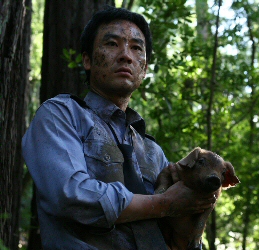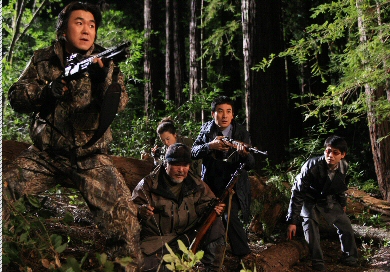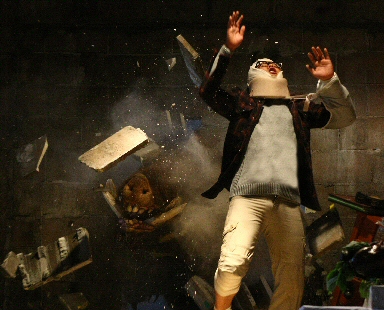We haven't had a good killer pig movie in quite some time, so Stu Willis was thrilled to see South Korean filmmaker Jung-won Shin revisit an often ignored shocker scenario for his film CHAW and to celebrate the UK release of the movie, from the fine folk at Optimum Entertainment, Stu kicked backed with Jung-won Shin to discuss his work…

Stu: Hi! How did you get into the film industry? Is there a particular route one takes to work towards the position of director in Korean cinema?
Jung-won Shin: After I graduated from university, I started off making short films, music videos, and commercials. While I was involved in making promotional clips for feature films and working as a visual supervisor which was an unfamiliar role at the time, I came across an opportunity to make my directorial debut.
Up until ten years ago, in order to become a film director in Korea, it was necessary for the person to go through an apprentice system by starting as an assistant in the director's unit to being an assistant director. Nowadays, film directors turn up from various fields such as scriptwriting, film schools, commercials, theatrical directing, etc. As the Korean political and social environment changed over the years, the art and entertainment industry became more flexible.
Stu: Your debut film was SICILY 2KM, another mix of humour and horror. Can you tell us a little about this film? What you learned while making it, and how you used that experience to prepare for making CHAW?
Jung-won Shin: SICILY 2KM (a.k.a TO CATCH A VIRGIN GHOST) is a film about a group of diamond smugglers who are after a traitor who took off with the gang's jewels against small town folks who are not willing to give up the treasure that fell into their hands. It being my directorial debut, I find the film unsatisfactory in terms of the genre and technical aspects, etc., but on the other hand, I'm most attached to it.
On top of the burden of making my first feature debut, I had more difficulties such as experimenting with a mixture of film genres and shooting with a HD camera that was new at the time. In order to shoot with the newly introduced camera, the cinematographer and I had to spend weeks at Panasonic in Japan, Toei, post-production labs to learn and practice with the camera. And once the shooting was over, since we didn't have the HD editing facilities, we had to spend days and nights for weeks at the editing room trying to setup a post-production system. I remember that people from Panasonic head office in Japan had been quite surprised at the system that we had built. It sounds like a different era now remembering how difficult it was to work on digital in analog oriented post facilities.

But in effect, these technical experiences came in handy when I shot CHAW on HD which allowed more mobility and was cost effective. It was helpful creatively as well.
The film was an experience which allowed me to realize the audiences' responses to unfamiliar multi-genre films and to set the goals for the direction of my films.
Stu: CHAW harks back to the classic nature-runs-amuck films of the 1970s and 1980s - films such JAWS, ALLIGATOR, RAZORBACK, KINGDOM OF THE SPIDERS etc. Are there any conscious nods to these films in CHAW?
Jung-won Shin: I'm very fond of genre films such as FORBIDDEN PLANET, PLANET OF THE APES, ALIEN, etc., but I also love comedy films mixed with satires and mockeries by Philippe de Broca and Mel Brooks. And I'm a fanatic fan of Zucker brothers' TOP SECRET! and AIRPLANE!.
Considering that Spielberg's films before EMPIRE OF THE SUN can be positioned somewhere between genre and satire humor films, he is my favorite filmmaker and I think I've been most influenced by him. Experiments in terms of genre for CHAW have been of course influenced by these films and filmmakers.
Stu: The FX in CHAW are a mix of prosthetics and CGI. Can you speak a little about working with both: the benefits and problems you may encounter with both, which you prefer, how they both complement the film etc?

Jung-won Shin: I can't think of a much merits in using both prosthetics and CGI in the film. But it would have been impossible to shoot the film without both. So it was an ironic situation.
We had used prosthetics in order to cut down on CGI shots to reduce time and cost and also to make it easier on the sensitive actors for their performances. But it didn't move in the way we thought it would and without an experienced professional in this field in Korea, it was a series of obstacles.
Moderated movements of life forms such as dinosaurs or aliens and of mammals that we are accustomed to are entirely different. More so because each strand of hair on the wild boar had to move organically like it would on a live boar, which made the fake more noticeable. But CGI was not the answer unless we could afford the time and cost of the Hollywood companies with their know-how. The audiences are already so used to the HARRY POTTER series, TRANSFORMERS, and TERMINATOR SALVATION, so they will not easily accept films of a lesser calibre.
Creating Chaw was a new experience for the crew in US as well so they had been uneasy and probably had felt their limits. It would be relatively easier to create King Kong or primitive animals because we haven't seen them in real life. But the Chaw had to be very real and true and not shown as an imaginary or comic book creature.
If someone comes to me and says, "I want to make a film with hairy mammals", I'd say think again. But personally, I believe I had made the right decision as it surely gave me the technical experience. I heard the shark prosthetics for JAWS had caused malfunction on a daily basis was the reason that the film didn't show much of the shark and only suggested its existence with music (which actually turned out for the best). It was slightly easier for me, I think.
Stu: As with most Korean films, there are interesting commentaries on themes such as family, friendship, loyalty, loss and so on in CHAW. Can you discuss their significance in your films? How do they reflect your culture?
Jung-won Shin: Korea is not a country that went through a social reform such as Industrial Revolution but had been under a military dictatorship rule for a long time. It is a chaotic society that holds traditional Confucianism values like filial piety while relationships varying on ranks and classes still exist. Family, loyalty, etc. are common elements in the Korean society and they constitute an essential part of Korean films. These conflicts of culture and ideas in a period of transition are the issues that need to be solved and the reasons for complications for the young people in Korea.
Stu: How important is the balance between humour and terror in your films? And, how do you measure it?
Jung-won Shin: If film is a miniature version of life, people would laugh at least a couple of times each day. Based on my experience, I find that people tend to laugh instinctively even when faced with critical situations. Despite the terrors, tragedies, throughout history, humor is an essential element that cannot be omitted. And it will be the same for any kind of film genres.
Stu: How has the film been received so far?
Jung-won Shin: I heard that the audience responses vary in extremes. Like people say, if you like it you love it, if not, you completely dislike it. I didn't aim to make a harmonious children's movie that everybody loves. Some people even disapprove AVATAR.
As a film director, I believe it is a blessing to have audiences that support you and those who disapprove you. It would be a problem when you don't have either one.
Stu: Are you able to discuss your plans for films you hope to direct in the future? Are you working on anything at present?
Jung-won Shin: I'm unable to say at the moment, but it'll be an extension of what I've been worked on so far. It'll hopefully be a completion of my filmmaking, experiments, and experience. And after my next project, there will probably be another new direction for me to take.
CHAW is available now on DVD from Optimum Hone Entertainment.
Special thanks to Jung-won Shin and Candy at Optimum.